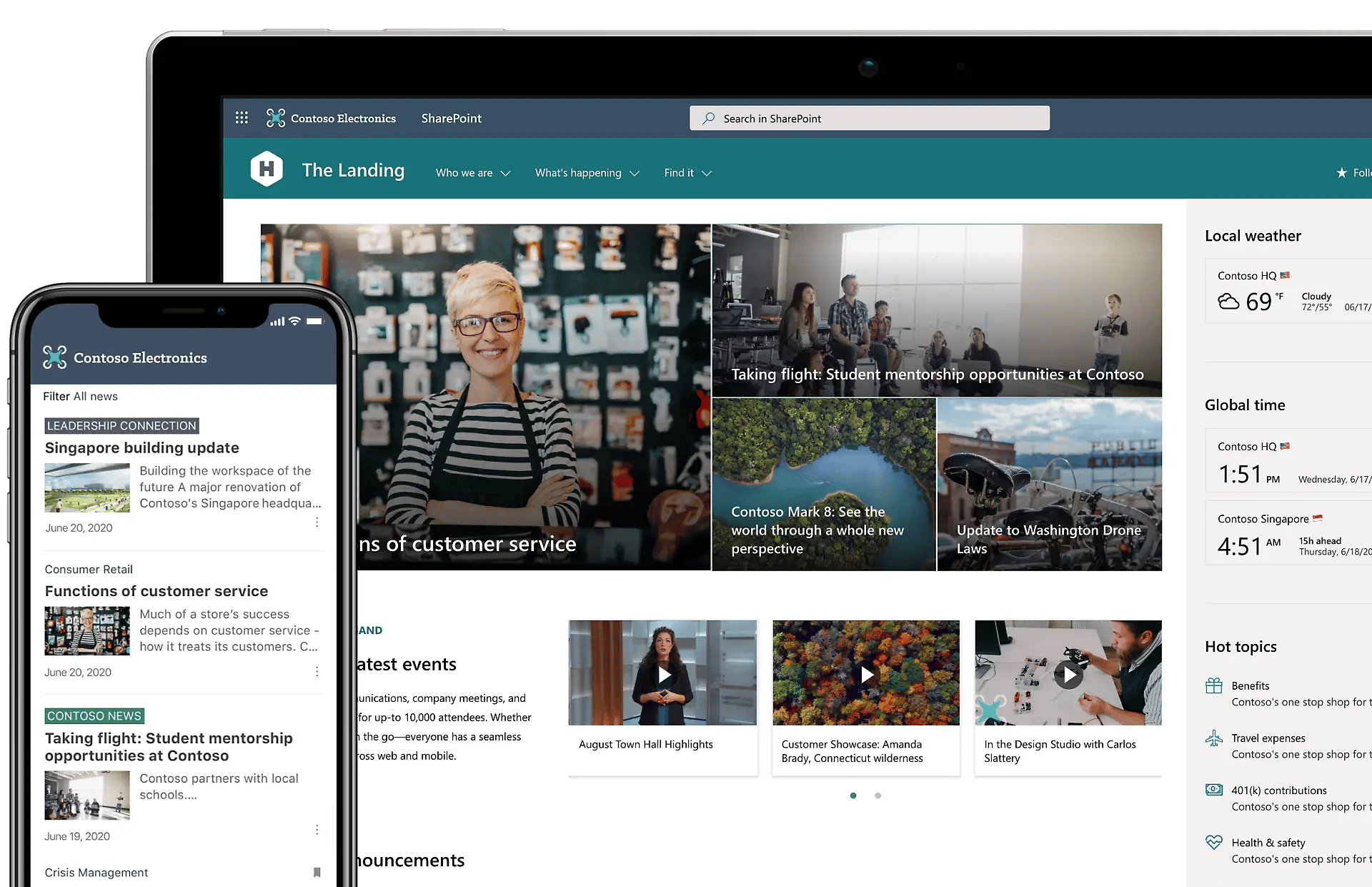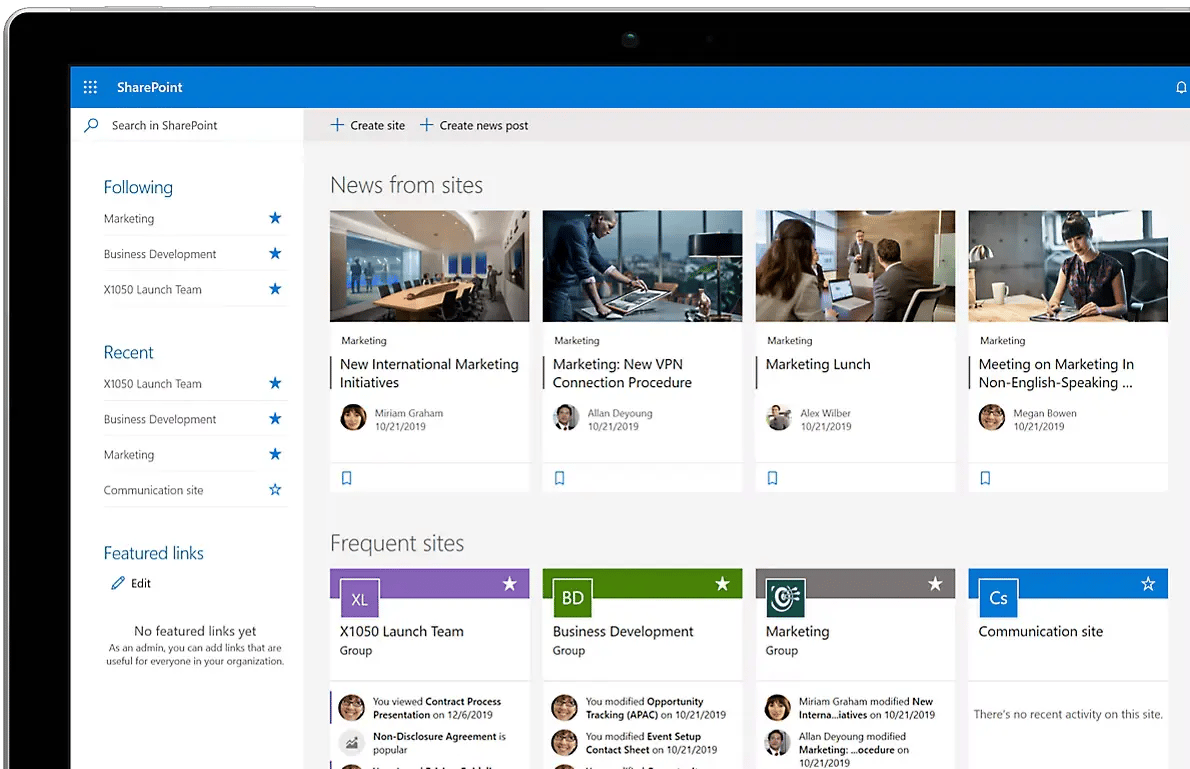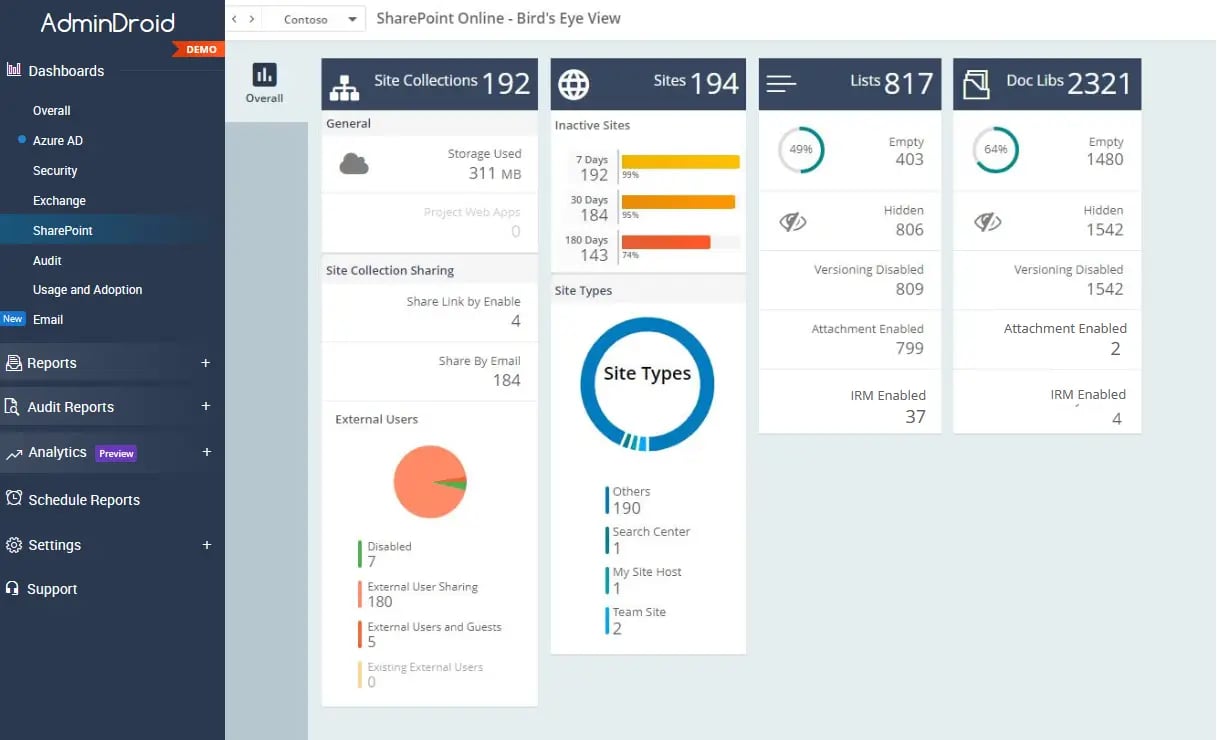Are you looking for an efficient way to store and share important documents, create collaboration sites, and link your intranet pages across multiple devices?
If so, then it’s time to explore the versatile platform of SharePoint. This comprehensive system was created specifically with businesses in mind; allowing teams within your business to effectively work together without physical boundaries or technical hurdles.
From immense scalability features that make managing files a breeze, to deeply integrated tools, like its robust search engine components—SharePoint offers a host of valuable benefits that can elevate the productivity of any workplace.
The main advantage of using SharePoint online is that it centralises all your documents and information into one easily accessible location.
Keep reading to learn more about how you can use SharePoint as part of your business strategy!
SharePoint is a Web application framework from Microsoft, which was designed to integrate intranet, content management systems, and document management.

Key Features of SharePoint
One of the most significant features of SharePoint Online is its ability to automate business processes through workflow automation.
With SharePoint, businesses can create custom workflows that streamline operations, reduce manual processes, and improve accountability.
Another helpful feature of SharePoint online is the ability to manage documents, including centralised storage, secure sharing, online reporting and real-time collaboration.

The platform also provides a range of communication features that allow teams to stay connected and work together more effectively, including news feeds, chat, and video conferencing.
Benefits of Using SharePoint
Here are 10 key advantages of SharePoint online which include:
1. Improved Accessibility
One of the main benefits of SharePoint Online is its accessibility. SharePoint Online is a cloud-based platform that provides users with anytime, anywhere access to their documents and data.
This makes it easy for remote workers to collaborate on projects and access important information without having to be in the office.
Additionally, SharePoint Online is accessible from any device, including tablets and smartphones, making it even easier for people to stay connected no matter where they are located.
2. Security and Privacy
SharePoint Online also benefits users with enhanced security measures to protect their data and documents.
The platform features built-in encryption technology that scrambles data as it travels between devices, making it nearly impossible for hackers to intercept or steal sensitive information.
Additionally, the benefits of SharePoint include multi-factor authentication, which requires users to provide two or more forms of identification before accessing the system.
3. Collaboration on Projects
SharePoint Online benefits teams by being able to collaborate on projects easily by providing them with a centralised hub for communication and file sharing.
Users can easily share documents and files through the platform’s permission-based system, ensuring that only authorised individuals have access to sensitive information.
Additionally, SharePoint Online includes powerful search capabilities that make it easy for users to quickly find the information they need when they need it.
4. Automation of Common Tasks
SharePoint Online also benefits users the ability to automate common tasks such as document management and workflow processes.
This allows teams to streamline their workflows and reduce manual labour while still ensuring accuracy and consistency in their results.
Additionally, automation helps organisations save time and money by reducing the amount of time required to complete certain tasks or processes.
5. Customisation
Another great benefit of using SharePoint Online is its ability to be customised according to an organisation’s specific needs and requirements.
For example, users can create custom dashboards that provide them with real-time insights into the performance of their business operations or create custom forms that help them collect essential data from customers or clients quickly and easily.

With its wide range of customisation options, SharePoint Online can be tailored to meet virtually any business need or requirement imaginable.
6. Cost Savings
Using SharePoint Online can help businesses save money in several ways compared to traditional on-premise solutions such as servers or dedicated hardware systems.
First, organisations don't have to purchase expensive hardware upfront since all services are managed through Microsoft's cloud infrastructure.
Second, since updates are managed automatically there is no need for additional IT staff.
Thirdly, since all services are provided remotely there is no need for additional office space.
Finally, since all services are provided at a fixed monthly fee there is no need for additional capital investments over time.
7. Easy to Use
SharePoint utilises recognisable client desktop applications which provide a comfortable and consistent user experience.
This makes SharePoint easy to understand, practical, and functional and allows users to build tools and solutions without the need for a developer.
Whether you need to build or update a website or create an online tool for your team, SharePoint has the tools available without the need to use other applications or undertake programming.
Also, it provides everything you need to build and manage an intranet website for your organisation which will enable you to communicate internal information such as corporate information, HR Policies, and news around all sites within the organisation.
8. Content Management
Another major benefit of SharePoint is its content management. Creating and presenting content for approval is really easy to do and due to its integration with Microsoft, SharePoint allows team members to share and collaborate information using familiar tools and functions.
It also allows users to create folders known as Document Libraries, these contain word or PDF documents and are efficient in strategically organising multilingual content in the simplest, achievable manner.
9. Faster Data Collection
The built-in data validation in SharePoint lets businesses collect accurate data from its consumers and web users. This reduces errors in data collection and helps develop operational strategies.
Also, it allows organisations to become more efficient in making key business decisions as accurate data will quickly be available.
10. Seamless Site Consolidation
Undeniably, SharePoint’s most powerful capability is its capacity to incorporate different sites in one, single platform by way of merging intranet, extranet and internet sites seamlessly and efficiently.
This alone is key to eliminating costs involved in running them independently, a strength that made SharePoint amongst Microsoft’s top products.
In addition to this, SharePoint also works seamlessly with other programs already utilised such as Microsoft Office, Microsoft Unified Communications and Exchange Server.
While SharePoint offers numerous advantages, it's important to acknowledge and address some of its disadvantages. Let's delve into a few key points.
Drawbacks of SharePoint Online
Here are 4 major disadvantages of SharePoint to consider:
1. Pricing Issue
One of the main drawbacks of using SharePoint Online is the cost. Depending on the size of your business and the features you require, SharePoint Online can be quite expensive.
Additionally, if you need to add more users or features, you may need to upgrade your subscription which can also add to the cost.
2. Security Concerns
Another potential drawback of using SharePoint Online is security concerns. Since your data is stored in the cloud, it is vulnerable to cyber-attacks and other security threats.
To ensure that your data is secure, you should make sure that your SharePoint Online subscription includes robust security features such as encryption and two-factor authentication.
3. Limited Customisation
SharePoint Online also has limited customisation options compared to an on-premise installation of SharePoint Server.
This means that if you want to customise certain features or create custom applications, you may not be able to do so with SharePoint Online.
4. Lack of Support
Finally, one of the biggest drawbacks of using SharePoint Online is a lack of support from Microsoft 365.
While there are some online resources available for troubleshooting issues with SharePoint Online, they are often limited and can be difficult to navigate for those without a technical background.
Conclusion
In conclusion, SharePoint Online is an incredibly useful tool for businesses looking to manage documents, automate business processes, and rapidly collaborate on projects.
SharePoint offers an array of advantages such as improved accessibility, enhanced security privacy, and the ability to customise and streamline common tasks.
Additionally, SharePoint also has its drawbacks such as pricing issues, security concerns and limited customisation.
Despite some of its limitations, businesses can reap a multitude of benefits when using SharePoint Online.
Thus, companies need to weigh the pros and cons to determine if this smart technology solution is right for them.
Have you considered how using SharePoint Online could take your business to the next level?
If you are looking to learn more about SharePoint or would like to learn how to navigate it, contact us today to see how we can help.

-1.png?width=552&height=678&name=text-image%20module%20desktop%20(4)-1.png)


.png?width=2000&name=Case%20study%20(21).png)


-2.png?width=422&height=591&name=text%20image%20tablet%20(31)-2.png)

-2.png?width=1366&height=768&name=Blog%20Hero%20Banners%20(4)-2.png)
-2.png?width=1366&height=768&name=Blog%20Hero%20Banners%20(5)-2.png)



